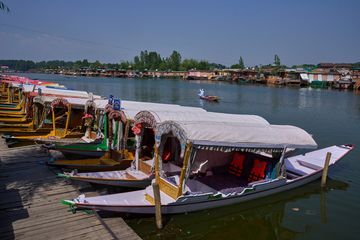After decades of turbulence, the people of Kashmir were beginning to find their footing amid peace, slowly gaining a stake in stability and its rewards. Last year witnessed a record-breaking tourism boom, with 2.3 crore visitors flocking to the region. This resurgence offered the local people not just economic opportunities, but also a rare chance to reclaim a semblance of normalcy.
But this fragile equilibrium was shattered by the Pahalgam terrorist strike, one that pierced the heart of Kashmir’s feel-good story of the past three years. Tourists, once full of curiosity and enthusiasm, were now rushing out of the valley, cancelling bookings en masse. The shadow of uncertainty loomed large, and in this climate, a reversal of fortunes seemed inevitable. This must not be allowed to happen.
The tragic event in Pahalgam has cast a long shadow over the valley’s future, with reports indicating that 60-90 per cent of tourist bookings across Kashmir have been cancelled. A hotel association has reported 13 lakh cancellations for August alone. While tourism may not be a primary yardstick in most states, it is of immense importance to Jammu & Kashmir, since tourism is its largest industry, contributing approximately 8.5 per cent of the territory’s income.
The significance of tourism for Kashmir becomes even clearer when one examines the numbers. Between 2021 and 2024, tourist arrivals in the Jammu region grew by 90 per cent, but Kashmir saw an astounding 425 per cent increase, soaring from 6.7 lakh to 35 lakh visitors. This surge represented a massive vote of confidence from Indians across the country, as well as from foreign tourists, whose numbers jumped from just 1,614 in 2021 to 43,654 in 2024. Tourism has become both an economic lifeline and a critical bridge for fostering people-to-people connections, helping to integrate those who feel alienated.
Given this context, the government must act swiftly to ensure that Kashmir does not lose its place on India’s tourist map—not even for one season. The livelihoods of countless Kashmiris hang in the balance, and beyond the economic stakes, this is a test of national resolve. We cannot allow the terrorists to undo years of progress. The 2025 tourist season is not lost yet. With the Amarnath Yatra still weeks away and the school summer break on the horizon, there is time to rebuild confidence and salvage what looked to be a promising year for the valley.
Encouragingly, Kashmiris themselves have unequivocally condemned the attack, reaffirming where their sympathies and aspirations lie. In the heart of Srinagar, the city came to a standstill in a profound shutdown, the kind that speaks louder than slogans or speeches. Across Pahalgam and other towns, spontaneous protest marches were taken out, embodying the collective anguish of a people grappling with yet another tragedy. At the iconic Jama Masjid in Srinagar, worshippers gathered for Friday prayers wearing black armbands—a symbol of solidarity in grief and defiance in despair. Newspapers, typically brimming with political stories, chose instead to present blackened front pages, an eloquent statement of sorrow and rage.
Amid this mournful tableau, tales emerged from Pahalgam that offer a potent glimpse into the humanity that persists in Kashmir. Visitors from across India, who narrowly escaped harm during the unrest, recounted acts of selflessness and courage—local Kashmiris risking their own safety to guide them away from danger. Among those who tragically lost their lives was a pony operator, Syed Adil Hussain Shah, whose ordinary occupation turned extraordinary in the face of calamity, as he helped strangers reach safety before succumbing to the violence when he tried to snatch a terrorist’s Kalashnikov. In the harrowing aftermath of the terror attack which claimed her father’s life, Arathi Menon from Kochi discovered “brothers” in two Kashmiris, Musafir and Sameer, who stood by her through the darkest hours. From taking her and her six-year-old twins to safety, to helping her locate her father’s body, to navigating the mortuary formalities, they guided her every step of the way.
Kashmir grieves, but it also protects, even in the midst of its darkest hours. The government must seize this moment, enhancing security arrangements without indulging in measures that inconvenience ordinary citizens. By striking the right balance, confidence can be restored, tourists will return, and Kashmir’s story of revival can continue unabated.
editor@theweek.in


